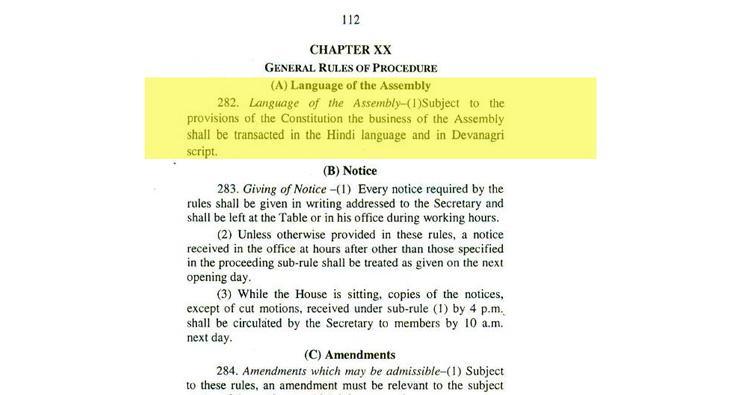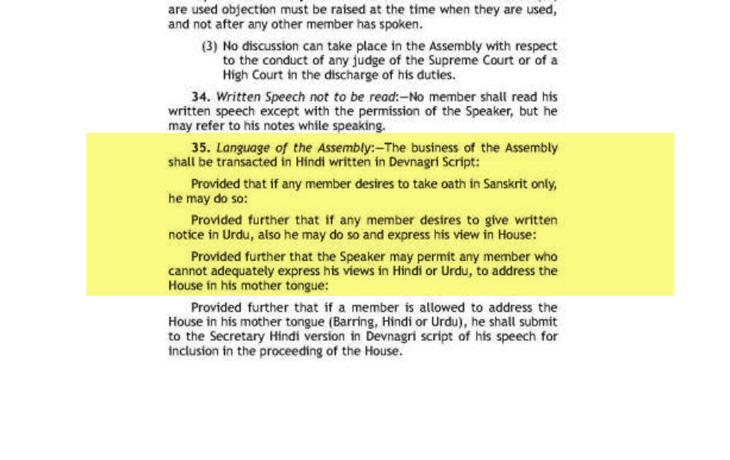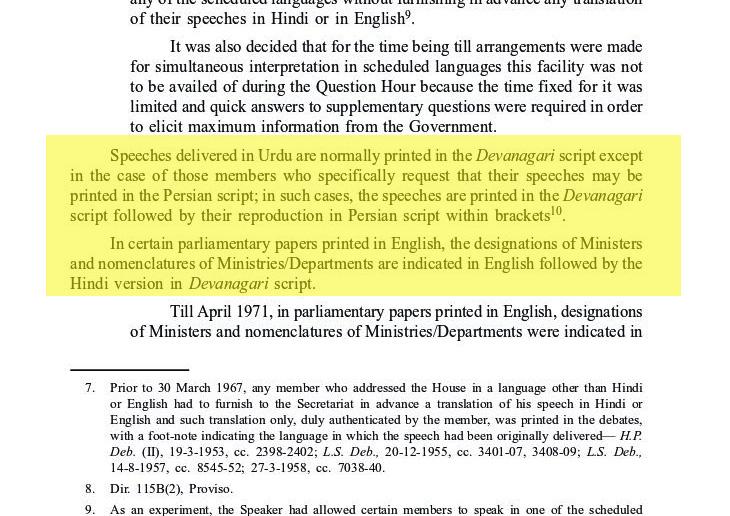Urdu oath row: Has UP Assembly been denying a Constitutional right?

When Samajwadi Party MLA Nafees Ahmad, protested over the invalidation of his oath in the Uttar Pradesh Assembly, his protest wasn't really unjustified. The language of the House has been turned into a tricky issue by various state Assemblies across the country, and by taking his oath in Urdu, Ahmad has revived an old constitutional debate.
The Rules of Procedure of the UP Assembly clearly state that “the business of the Assembly shall be transacted in the Hindi language and in Devanagari script”. If you see carefully, the rule talks about the language of “the business of the Assembly” broadly, and not oath, specifically.

Some Assemblies have specific mentions concerning language of the oath as distinct from the language in which the business is to be transacted.
In Bihar, for example, MLAs are allowed to take oath in Sanskrit, but the business of the House is to be transacted in “Hindi written in Devanagari script”.
Additionally, Urdu is also allowed for making speeches and submitting written notices. The Assembly even allows the use of mother tongue, if the member concerned “cannot adequately express his views in Hindi or Urdu”.

The UP Assembly's rules do not make this distinction between general business and oath. However, an apparent bias against Urdu emerges clearly when its negation is held in contrast with the leeway given to Sanskrit.
At least 13 BJP MLAs took their oath in Sanskrit, and they were not asked to switch to Hindi. An officer of the House told Catch that this was because Sanskrit was written in Devanagari, which is the script followed by the Assembly.
Go back to the Rules of Procedure and you will realise that the Devanagari requirement is only for the script i.e. recording the proceedings in writing. The implication is that Hindi is to be used while speaking in the House, and the record is to be maintained in only Devanagari script. It should be noted that Sanskrit is not even mentioned anywhere in the rules. It appears that it has been surreptitiously allowed on the pretext of the Devanagari script clause.
What is the status in Parliament?
At the Parliamentary level, members are free to “make and subscribe the oath or affirmation” in English or in any of the 22 languages specified in the Eighth Schedule to the Constitution. These include – Assamese, Bengali, Gujarati, Hindi, Kannada, Kashmiri, Konkani, Malayalam, Manipuri, Marathi, Nepali, Oriya, Punjabi, Sanskrit, Sindhi, Tamil, Telugu, Urdu, Bodo, Santhali, Maithili and Dogri.
Not only is Urdu allowed for taking oath in, speeches are also delivered in Urdu. These are normally printed in the Devanagari script, but when members specifically request that their speeches may be printed in the Persian script, these speeches are printed in the Devanagari script followed by their reproduction in Persian script within brackets.

Former Secretary General of the Lok Sabha, PDT Achary, told Catch that this respect for all 22 languages of the Eighth Schedule also automatically applied to all states without any discrimination. He asserted that if any state had been doing otherwise, it was guilty of arbitrary action and denial of the subject's Constitutional rights.
In UP's case, this treatment of Urdu is all the more surprising, given that Urdu is officially the second language of the state administration. Why should it not be allowed in the Assembly?
The onus of doing so doesn't just fall on the new BJP government – it stretches to previous SP, BSP and Congress governments as well.
It is puzzling, for example, why senior SP leader Azam Khan would retake his oath in Hindi and never try to get the rules changed, in spite of being the Parliamentary Affairs minister in the previous SP government headed by Akhilesh Yadav.
First published: 31 March 2017, 21:05 IST






![BJP's Kapil Mishra recreates Shankar Mahadevan’s ‘Breathless’ song to highlight Delhi pollution [WATCH] BJP's Kapil Mishra recreates Shankar Mahadevan’s ‘Breathless’ song to highlight Delhi pollution [WATCH]](https://images.catchnews.com/upload/2022/11/03/kapil-mishra_240884_300x172.png)

![Anupam Kher shares pictures of his toned body on 67th birthday [MUST SEE] Anupam Kher shares pictures of his toned body on 67th birthday [MUST SEE]](https://images.catchnews.com/upload/2022/03/07/Anupam_kher_231145_300x172.jpg)



_in_Assams_Dibrugarh_(Photo_257977_1600x1200.jpg)


